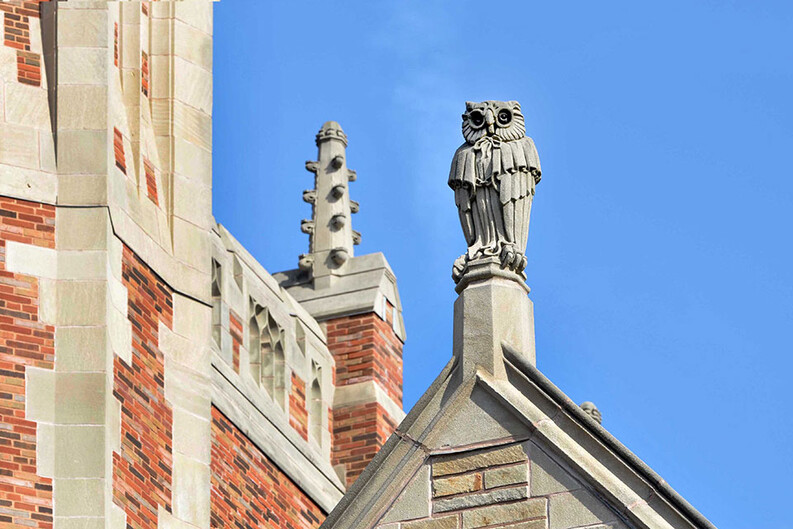Clinic Advocates for Parole Opportunities for People Sentenced as Young Adults

On March 10, 2020, criminal justice reform advocates, formerly incarcerated people, and family members urged members of Connecticut’s Judiciary Committee to support S.B. 978, a bill that would give incarcerated people serving long sentences for crimes committed before the age of 25 the chance to seek parole.
The Challenging Mass Incarceration Clinic (CMIC) at the Yale Law School Jerome N. Frank Legal Services Organization submitted testimony in support of the bill’s passage out of committee. Brendan Bernicker ’22 also testified at the hearing, on behalf of the clinic and fellow clinic members Sarah Medina Camiscoli ’21, Marnie Lowe ’22, and Alexandra Ricks ’22.
Currently, all people sentenced in Connecticut as juveniles have an opportunity to apply for parole. In 2012, the Supreme Court of the United States decided in Miller v. Alabama that mandatory life-without-parole (LWOP) sentences for people under 18 constitute cruel and unusual punishment under the U.S. Constitution, because research demonstrated that they were more impulsive, more susceptible to peer pressure, and more capable of rehabilitation than adults. Responding to Miller, the Connecticut legislature passed Public Act No. 15-84 in 2015, which expanded upon this mandate by allowing all incarcerated people serving sentences of more than 10 years for crimes committed before the age of 18 to have the chance to demonstrate their rehabilitation by applying for parole through the Board of Pardons and Parole (BOPP).
While the current state legislation has a hard cutoff at age 18, a growing body of neuroscience and psychology research demonstrates that age 18 is not a hard cutoff for development, say supporters of the bill. “Current research shows that, like adolescents, young adults up until at least age 25 are also more impulsive, easily influenced by peers, and able to change than are older adults,” said Lowe, also of the clinic. The proposed legislation responds to this scientific evidence by providing people sentenced for crimes they committed as young adults the chance to demonstrate their rehabilitation, just like those who committed crimes just a few years younger.
“Through this work, we have seen first-hand that many people in Connecticut prisons do not need to be there. They have been successfully rehabilitated and continuing to incarcerate them hurts them, and their families and communities,” Bernicker said in his testimony. Bernicker highlighted how clinic students see the research evidence in practice while working with clients sentenced as young adults.
The CMIC’s written testimony also highlighted the practical implications of opening up parole eligibility to all incarcerated people sentenced as young adults: implementing cost savings while improving public safety. “Taxpayers also suffer a loss: incarcerating somebody for a year in Connecticut costs a whopping $65,233,” according to the clinic, citing statistics from the Vera Institute of Justice.
These high costs do not result in effective rehabilitation for incarcerated young adults. “If the bill does not pass, nearly all of the people to whom it would expand parole will be released from prison anyway, though they will be released after spending more time in prison and without having had the same incentives to engage in rehabilitative programming and keep out of trouble. There is strong causal evidence that spending more time in prison makes people more likely to commit crime,” the CMIC wrote in its testimony.
The CMIC testimony also explained how the proposed legislation would serve to address some of the racial disparities in the criminal justice system, as young Black adults are disproportionately incarcerated compared to other groups. Ricks, another CMIC student, said that “passing this legislation would be a step in the right direction: towards remedying Connecticut’s severe racial disparities in incarceration and the harms of it on individuals, families, and communities.”
If passed, the legislation would allow people to apply for parole if they were under age 25 at the time of their crime and are serving sentences of more than 10 years. People serving sentences of 50 years or less would become eligible to apply for parole after serving 60 percent of their sentence or 12 years, whichever is less. Those serving sentences of more than 50 years would become eligible after serving 30 years in prison. The Connecticut Board of Pardons and Paroles, which also submitted testimony in support of the bill, would evaluate the extent of the applicant’s rehabilitation, weighing any input from victims and/or the State’s Attorney, and make a determination about whether that individual is prepared to reenter society.
S.B. 978 received support in written and oral advocacy from over 70 individuals and groups, including the Connecticut Board of Pardons and Paroles, the Connecticut Office of the Chief Public Defender, the ACLU of Connecticut, the Quinnipiac Law School’s Juvenile Sentencing Project Legal Clinic, the Transitions Clinic, the Connecticut Chapter of the National Association of Social Workers, the Sentencing Project, the Yale Black Law Students Association, and the National Lawyers Guild at Yale Law School.
The CMIC, led by Clinical Associate Professor of Law Miriam Gohara, represents indigent clients in state and federal proceedings, some of whom would benefit from parole eligibility if the bill passes.


